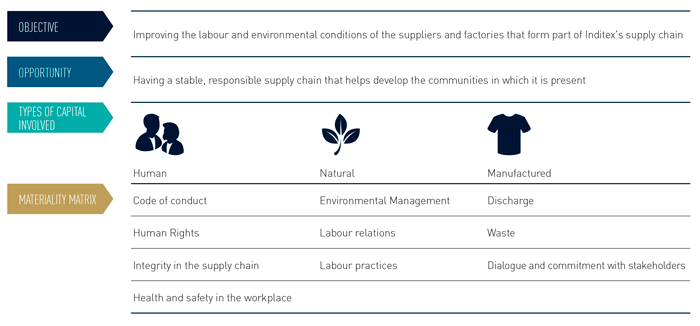1. Managing and strengthening the supply chain

Inditex 's response to the “assessment of the real and potential impact of [its] activities”, presented in the UN's Guiding Principles, is included in its Compliance Programme.
This tool, designed by Inditex and constantly revised and updated, provides ample information on the assessment of the Group's suppliers based on their degree of compliance with the Code of Conduct for Manufacturers and Suppliers, the identification of specific areas of improvement and the implementation of corrective action plans.
New Code of Conduct for Manufacturers and Suppliers
The Code of Conduct for Manufacturers and Suppliers is used by Inditex to structure the work carried out to control and strengthen the supply chain.
This Code was first ratified in February 2001 by the Inditex Board of Directors and later reframed in June 2007. On July 16, 2012 the Board approved a rewrite that aimed to update the Code by incorporating best practices to extend its validity and to encourage mandatory compliance by Inditex’s manufacturers and suppliers.
The modifications made to the formulation of the Code of Conduct for Manufacturers and Suppliers are proof of the document’s flexible nature within Inditex. Some of the most important changes are:
Strengthening existing commitments
| ITEM OF THE CODE | NEW ITEM | NEW FORMULATION |
|---|---|---|
| Environmental Awareness |
This strengthens the suppliers' compliance with Inditex's specific environmental standards and minimises the impact or ecological footprint of the products | Manufacturers and suppliers shall be duly committed at all times to protect the environment and shall comply with the standards and requirements of the applicable local and international Laws and Regulations |
|
|
|
Likewise, they commit to comply with environmental standards established by Inditex including, if applicable, the necessary measures to reduce and compensate such impact in order to apply said standards |
Aspects not covered by the previous code
| ITEM OF THE CODE | NEW ITEM | NEW FORMULATION |
|---|---|---|
| Code Implementation |
Manufacturers and suppliers can contact the Ethics Committee at Inditex through a Whistle-Blowing cannel | This Code is aligned with the principles and values that are included in the Inditex Code of Conduct and Responsible Practices, which regulates a Committee of Ethics and Whistleblowing Channel to ensure its enforcement |
|
|
|
In this sense, and in order to ensure the enforcement of the Code of Conduct for Manufacturers and Suppliers, the Committee of Ethics can act at its own initiative or following a formal complaint made in good faith by a manufacturer, supplier or other interested third party that might have any direct relationship or commercial or professional interest with Inditex |
|
|
|
To this end, any notices given pursuant to the provisions of this Code, either reports of any breach or enquiries regarding the Code’s interpretation or application can be addressed directly to the Committee of Ethics via post, email and/or fax. |
| Confidentiality of Information |
A new clause that stipulates how sensitive information should be processed | Manufacturers and suppliers are obliged to preserve the integrity and confidentiality of the information they receive as a consequence of their commercial relationship with Inditex |
Traceability
Production traceability is key in the textile industry as a tool to control the relevant risks to Fundamental Labour Rights. The new Code of Conduct for Manufacturers and Suppliers, ratified in July 2012, establishes that:
“Manufacturers and suppliers shall not assign any work to third parties without the prior written authorization of Inditex. Those who outsource any work shall be responsible for the enforcement of the Code by these third parties and their employees”.
This Code is binding for all suppliers and manufacturers that enter a commercial relationship with Inditex. In addition, Inditex sets up measures of control to mitigate the risk of non-authorised production, such as:
- Analysing production capacity ratios based on orders assigned per supplier / manufacturer
- Establishing a dynamic channel of communication and approval of the manufacturers that produce the orders assigned by Inditex
- Setting up specific auditing and control procedures for secondary and subsequent manufacturing levels within the supply chain
- Adapting Inditex's computer tools so that all factories involved in production can be registered
- Setting up a system to control production at source
During the 2012 financial year the following activities carried out within the framework of the Code of Conduct for Manufacturers and Suppliers are worth special mention:


